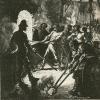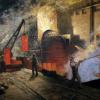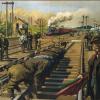Organizing steel
From scrap to scrap
International organizations such as the United Nations Economic Commission for Europe (UNECE) and the Organization for European Economic Cooperation (OEEC, now the OECD) made steel a priority area after the Second World War. After all, steel was an essential commodity, not just for waging war, but also for reconstructing destroyed infrastructures.
International organizations played an important role in allocating steel scrap across borders; for example, to increase steel production for reconstructing the European economy. When the Soviet Union refused to coordinate steel scrap allocation in the UNECE, the OEEC played a leading role in its effective distribution in Western Europe from 1948.
European companies still play a central political role in World Steel, the global organization of steel companies, which continues to have its headquarters in Brussels. Their close collaboration since 1884 has made it easier for them to mediate among steel companies globally, at a time when the output of crude steel is now eight times higher in Asia than in Europe.
 Previous Story
Next Tour
Previous Story
Next Tour
How to cite this page
Wolfram Kaiser, 'Organizing steel', Inventing Europe, http://www.inventingeurope.eu/governance/organizing-steel
Sources
- Kaiser, Wolfram and Johan Schot. Writing the Rules for Europe. Experts, Cartels, and International Organizations, chap. 7. Basingstoke: Palgrave Macmillan 2014
- Warren, Kenneth. World Steel. An Economic Geography. Newton Abbot: David & Charles, 1975.



















